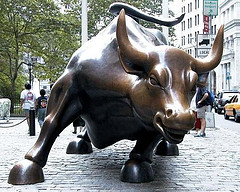After reaching a record high of $56.4B spent in 2014, the U.S. is on track to smash that record and break $70B in Venture Capital (VC) spending by the end of 2015, according to “Venture Pulse Q2´15”, a report from KPMG International and CB Insights. With $36.9B already invested in the first half of the year, the final total money spent by VCs in 2015 could mark a five-year high for the U.S.
According to the report, the U.S. has collectively seen more than $15B invested in four of the last five quarters, including more than $18B in both quarters of 2015 (which contained large deals to airbnb, Zenefits, and Wish, among others). In addition, Q2’15 was a banner quarter for Unicorns – VC-backed companies with valuations in excess of $1 billion. During Q2’15, 24 VC-backed companies achieved Unicorn status (up from just 11 in Q1), including 12 in the U.S. and nine in Asia. Much of the growth in the number of Unicorns can be linked to the availability of late-stage funding.
“Activity is high and should remain so, with 2015 shaping up to be a record year,” said Brian Hughes, National Co-Lead Partner, KPMG LLP’s Venture Capital Practice. “This is driven by a number of factors, including low interest rates, strong participation by corporate investors, and new capital sources such as hedge and mutual funds. Companies are staying private longer and growing to an immense size as a result of access to investment and stronger investor interest, combined with a trend toward late stage mega-rounds.”
Hughes added, “While many analysts are predicting a slight decrease in VC investment in the months ahead, we believe the strength of such fundamental growth drivers have created strong conditions for continued investment.”
The reseach also shows that 55 percent of all VCs in Q2’15 were based in either California, New York, or Massachusetts; Deal activity in California continues to top 400 per quarter (488 in Q2 ’15); and New York has now outpaced Massachusetts in 4 of the last 5 quarters (142 to 117 in Q2 ’15), with the exception of Q1’15 when both states had the same number of deals (121).
In the past year, Internet companies have dominated the marketplace of VC-backed deals, and, in Q2 ’15, they have continued to trump all other sectors with 45 percent of the share, followed by Mobile & Telecommunications (16 percent), Healthcare (14 percent), Non-Internet/Mobile Software (6 percent), Consumer Products & Services (3 percent) and all other sectors (15 percent).
According to the report, Internet companies also topped other sectors based on dollar shares, jumping from 34 percent in Q1 ’15 to 51 percent in Q2 ’15. This increase was primarily led by airbnb’s $1.5B financing in late June. Mobile companies’ dollar share followed with 14 percent in Q2 ’15 (a decrease of 13 percent from Q1 ’15). This decrease can be attributed to Uber’s multiple billion dollar financings in Q1 ’15 compared to the largest Mobile financing of Q2 ’15 (Snapchat at $337M).
“Numerous disruptive technologies and applications are also spurring interest and investment from the VC community,” said Conor Moore, National Co-Lead Partner, KPMG LLP’s Venture Capital Practice. “The growth of new on-demand platforms continues to be particularly robust. This trend, which escalated with Uber and airbnb, is now expanding into new verticals and well beyond North America.”
The analysis by KPMG and CB Insights also found that early-stage deals into VC-backed companies remained steady at 49 percent in Q2’15, while seed deal share dropped to a five-quarter low of 24 percent. Average early-stage deals were $5.3M in Q2’15, breaking $5M for the first time in five quarters.
Additionally, mid-stage (Series B – Series C) deal share reached a five-quarter high, accounting for 26 percent of all deals to U.S.-based VC-backed companies. Interestingly, average late-stage (Series D+) deals in North America rose for the third consecutive quarter, with an average late-stage deal size of $56.3M in Q2’15. This can be partially attributed to the rise of mutual funds, hedge funds, private equity firms and corporations in recent mega-financings.
Moore added that “the availability of these late-stage mega-deals continues to delay potential IPO exits. If companies can raise similar amounts of money through private financing, many companies will opt for it.”


